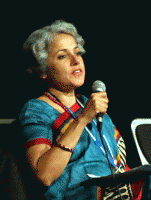
Dr Soumya Swaminathan to lead Indian Council of Medical Research (ICMR) and Dept of Health Research, govt of India
(Image by Citizen News Service (CNS)) Details DMCA
(CNS): Dr Soumya Swaminathan has recently been appointed as Director General, Indian Council of Medical Research (ICMR) and Secretary of Department of Health Research, Ministry of Health and Family Welfare, Government of India. Earlier she has served as Director, National Institute for Research in Tuberculosis in Chennai from 2008 till 2015.
Two days ago she spoke with Citizen News Service (CNS) about her priorities for accelerating progress towards a TB-free India, as well as in the field of medical research.
Here are some excerpts from her interview:
Q: What are the top 3-5 key actions you intend to take as DG ICMR and Secretary of Department of Health Research, for accelerating progress towards a TB-free India?
Dr Swaminathan: It is critical for India to address tuberculosis (TB). My top priority would be for bringing evidence to inform policy based upon hard data. So I would like to focus upon more real-time data collection, surveillance and data analysis to inform the Ministry [of Health and Family Welfare] so that it can make evidence-based interventions in the programme. ICMR can play a big role in providing data and evidence.
My second priority will be to establish a research consortium (or research partnership) for TB, where all scientists sit together--from Council of Scientific and Industrial Research (CSIR), Department of Biotechnology (DBT), Department of Health Research (DHR), Department of Science and Technology (DST), as well as Ministry of Health, among others. This consortium will identify the top priorities for India, pool their resources and work together. This work could be around understanding the epidemiology of TB transmission better and finding out why there are certain hotspots for MDR-TB; doing clinical studies for better treatment regimens for MDR-TB; development of indigenous diagnostics (this is already going on); and work on vaccines. As funds are limited, we need to pool our resources to avoid duplication and redundancy. We will have to work together. DBT Institute is good in basic science, while ICMR can do clinical research.
We also need to focus on a few things for paediatric TB. The first one is expanding access to high-quality diagnostics as use of GeneXpert improves the diagnosis of paediatric TB--it not only confirms TB but also picks up drug resistance. In the last year or so in a four-city project where more than 100,000 sputum specimens from children were tested, 600-odd tested positive and out of these 600, about 10% had rifampicin resistance. This came as a surprise to the paediatric community--they were not expecting such rates of drug resistance in children. Expanding access to good-quality diagnosis and appropriate treatment for children can go a long way to reduce mortality. Bringing down the incidence of TB in children will also involve expansion of contact tracing within the family of index TB cases detected both in the private as well as public sector; early detection of cases and then identifying vulnerable children below 6 years and putting them on chemo prophylaxis; for the contacts of MDR-TB cases it will basically be contact screening and keeping them under close surveillance as we do not have evidence base for prophylaxis. The daily treatment regimen for TB has to be scaled up both in the private and public sector.
TB rates among children with HIV are very high, even if they are on antiretroviral therapy (ART). And yet, a lot of this TB is being missed, as all of them are not being screened for TB, and even when they are, patients are asked to go somewhere else for diagnosis and we often lose the patient along the way. So there is a need for training the staff and also having good diagnostic facilities available on site at ART centres to ensure that as far as possible diagnostic tests are performed right there and the child is not made to go to another place for TB testing.
(Note: You can view every article as one long page if you sign up as an Advocate Member, or higher).





